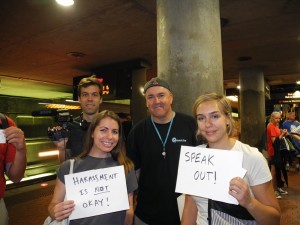 If you’re like me and tend to freeze up or draw a blank when you experience harassment, here’s a great resource to help you out, from our partner in Canada, METRAC. (They’re also the organization that also founded community safety audits).
If you’re like me and tend to freeze up or draw a blank when you experience harassment, here’s a great resource to help you out, from our partner in Canada, METRAC. (They’re also the organization that also founded community safety audits).
Via their press release:
“On September 10, 2012, METRAC released a free iPhone app, “Not Your Baby”, to help users deal with sexual harassment. Once installed, the app will allow users to input where they are – such as work, school or on the street – and who’s harassing them – such as a boss, coworker or fellow student. A response will be generated “in the moment”, based on the input of 238 people who shared what they’ve done to deal with similar instances of harassment. “Not Your Baby” also includes their stories and tips and allows users to submit their own….
“Not Your Baby” stands as an example of the power of technology to help people take action, including women, young women, LGBTTIQQ2S and other groups most at risk of sexual and gender-based harassment. It is available on iTunes and by visiting METRAC’s website, www.metrac.org.”
What a great idea!
The Torontoist has more:
“METRAC communications director Andrea Gunraj described the app as “another tool that people can use to feel empowered,” rather than a cure-all for sexual harassment. She pointed to work by groups including the White Ribbon Campaign, for encouraging men, who are overwhelmingly the perpetrators of sexual harassment, to talk about the behaviour and its impact. She sees a need for more resources for men, including those “who want to diffuse harassment, who want to say something and don’t know how.”
According to Gunraj, it’s up to communities to initiate the uncomfortable social conversations that can lead to reflection and change. She noted that “the biggest barrier is speaking about it and seeing it as a problem. Too often we accept harassment as a fact of life.””



